.jpg)
I'm starting to feel more comfortable to life here. One of the biggest adjustments I’ve had to make to life here is to learn to take things slow. There are a lot of hours during the day where it gets just too hot to do anything but sit under the shade of a nearby tree. This is supposedly still the cool season, but my thermometer got up to 105F the other day, so I am afraid for the hot season which goes from March to June. And everything just takes longer here. Sweeping my house takes at least an hour, and I have to do it at least a couple times a week because everything just gets so dusty here. I also have to fetch my own water, which means walking to the water pump in the morning, filling up my 3 20L jerrycans (they're actually empty industrial size vegetable oil containers, and they're called badongs here).
Because of all the work that has to be done throughout the day, kids start helping out at a very early age. It’s not uncommon to see a 6 year-old carrying around a 2 year-old. As soon as they are big enough, girls start fetching water, pounding, and cooking. They give the young girls small buckets to carry on their heads and mini pestles for pounding. You never see kids talking back to adults. As soon as they are told to do something by anyone older than them, regardless of who they are, they will do it without complaint. In the Peace Corps, they call this the “small boy system”. If you need some tea from the bitik, you just “small-boy” some kid standing around, give them some money and tell them to go to the bitik (the local shop) for you. The inverse of this system is that it is acceptable for children to ask adults for things, like money. And if a child is a part of your extended family, you are expected to help them with money for education, etc. in anyway that you can. This creates a mutually beneficial system and strong social fabric. Old people are cared for and respected. And even though children have to do a lot of work for their elders, every adult was a child at one point in their life and had to go through the exact same thing.
Life has a rhythm here, the rhythm of the land, which is something that I’ve never experienced before and is something that I think is missing from our fast-paced, frantic lives. The only rhythm I was really acquainted with before was the daily rush hour to and from work. Here, you can't help but feel the rhythm each and every day.
The most important season is the planting season, where the main crops are sorghum, millet, peanuts and corn and begins just before the rains arrive. Then the rainy season sets in around June or July until harvest time in September. This is also called the hungry season because the food stores from the previous year start to run out before the new harvest comes in. At least in The Gambia, there are not famines but most families reduce their meals from 3 a day to 2 a day, and options, like meat or vegetables, become limited or non-existent. After harvesting begins the cold season when women plant their dry season gardens and plant rice in their rice fields for harvesting in January. After the rice harvest begins the hot season where there is little farming to do but it is too hot and dry to do anything anyway. The hot season lasts until May or June when its time to plant before the rains come. This is mixed with the rhythm of Islam, where you have the holy fasting month of Rammadan, the end of Rammadan celebration called Korite, and the biggest celebration is Tabasci which usually falls around Christmas and is a celebration of the story of Abraham where every family is expected to sacrifice a ram if they can. On top of that is the more constant rhythm of the days. You have the four daily calls to prayer at 6:00AM, 2:00PM, 5:00PM and 7:00PM where everybody stops what they are doing and goes to pray. You have the weekly luumo, or market, on Thursdays where people come from all over the region and Senegal. And then you have the endless naming ceremonies, weddings and funerals where huge numbers of people from all over attend.
As for what I’m actually doing here, I’m still trying to figure that out. I don’t have any problem keeping myself entertained, that’s never been a problem for me, and I spend a lot of time just sitting and talking with people, or really just listening since I still don’t speak Wolof that well yet. The day to day things end up taking a lot of my time here. I get up in the morning and make tea and breakfast and spend a little bit of quiet time enjoying the cool morning in my house, then I go work in my garden which is just near my house in the same compound, go back to my house, straighten things up, and head to the office to see what’s happening there.
At the moment, there’s not much for me to do at the office because right when I first arrived here there was a bit of a management crisis so it remains to be seen what my role will be still. But I help out in whatever way I can. We had two groups of visitors from the UK who came from AVISU's parent organization and I helped show them around and see the projects that AVISU is currently working on. I've also helped out with a couple of agricultural trainings for local farmers and gardeners, an agro-enterprise survey, a beekeeping survey, and then just basic computer skills training.
Besides working at the office, I'm also interested in working with the local schools. I’ve met with the headmasters at the lower basic, upper basic and senior secondary schools and discussed various things I could work on with them. I’m planning on starting a current events club at the high school and possibly working with one of the schools on the Peace Corps School Tree Nursery Competition.
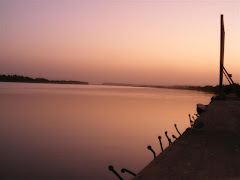.jpg)
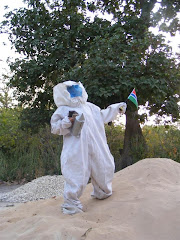.jpg)
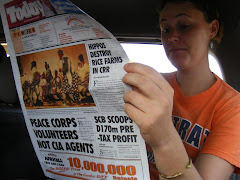.jpg)
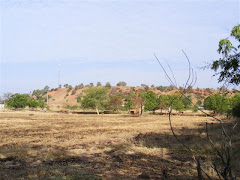.jpg)
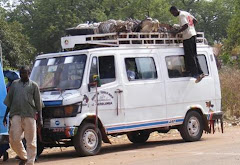.jpg)